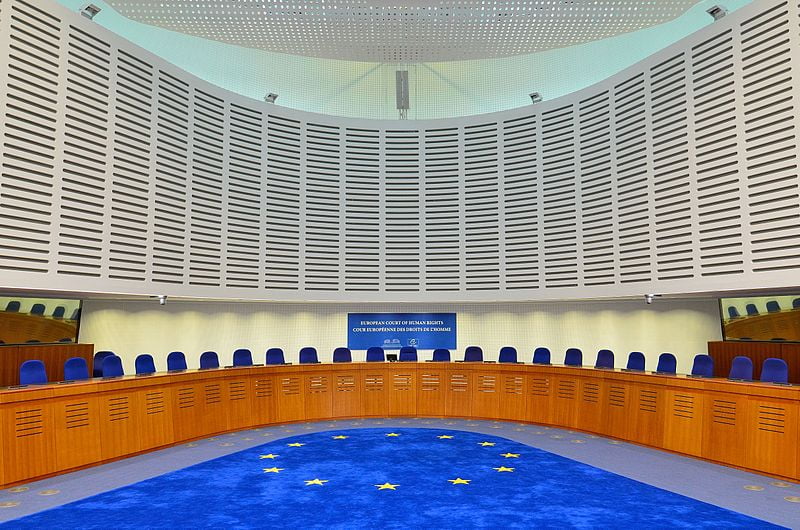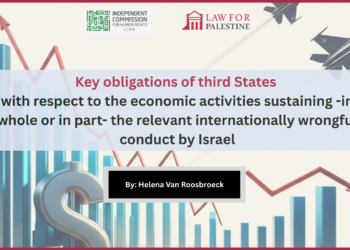What Did the Decision of the European Court of Human Rights on BDS Include?
By Rawan Radi
For: Law for Palestine
Decision Background
On June 11, 2020, the European Court of Human Rights (ECHR) condemned the decision of a French court for its violation of the right of expression of some pro-Palestine activists who were charged in 2013 for their call in 2009 to boycott products imported from Israel.[1] Following this court’s decision – and believing that this decision by the French Court of Justice violates article 10 of the European Convention on Human Rights that deals with the right of expression, those activists took their case to the ECHR.
In its comment on this French court’s decision, the Judiciary of the European Union said that, “it observes that the actions and the sayings attributed to the complainants (the pro-Palestine activists) fall under the struggle for political expression and are related to an issue of public interest”. The Judiciary also affirmed that it considers those activists’ condemnation with inciting discrimination because of their participation in the BDS campaign by the Court of Appeal in Colmar in 2015 “is not based on adequate and clear motives”. And therefore the European Court ruled that the French court’s conviction be overturned and that activists’ charge with discrimination be cleared. The European Court also ruled a financial compensation of 7,380 euros for every one of the 11 complainers in compensation for moral and financial harm, and it charged the claimants with 20 thousand euros in compensation for court expenses.
Case Development
In 2016, 11 members from Collective for Palestine resorted to the ECHR after they have been convicted in 2013 with incitement for discrimination by a French court because of their calling upon shoppers to boycott a big supermarket in Illzach, near Moloz, that sells Israeli goods, as part of the BDS campaign. As result, a conviction with “inciting for discrimination” was issued against them by the French court.
Case Deliberation
The ECHR continued its deliberation of the case over a period of five years, after which the activists were cleared of their charge. This was a decision with a very significant consequence for stumbling the Israeli pressures on the governments of the European countries to ban the boycott movement and to stigmatize its boycott/embargo campaign of Israeli goods produced in the occupied territories as anti-sematic.
A Background on the Parties Related to the Case
– First, the International Boycott, Divestment and Sanctions Movement (BDS) refers to the international economic campaign initiated by 171 non-governmental Palestinian organizations on July 9, 2005. The campaign called for the withholding of investments and for imposing sanctions on Israeli products made in the occupied territories to force Israel to comply with international law and the principles of human rights. The inception of the campaign coincided with the first anniversary of the ruling of the International Court of Justice against the Israeli separation wall in the West Bank.
The three declared goals of the campaign are[2] to (1) end the Israeli occupation and its colonization of Arab land, in addition to dismantling of the separation wall, (2) make Israel recognize the basic rights of the Palestinians, Arab citizens of Israel, based on equal rights, and (3) have Israel respect, protect and reinforce Palestinian refugees’ right of return to their homes and properties, as stated in the United Nations General Assembly resolution no. 194.
Included in the BDS’s activism is its call for companies and institutions to boycott Israeli companies and Israeli sport, cultural and academic activities, as well as boycott international organization complicit in the Israeli violations of Palestinians’ rights. These are the actions attributed to the complainants (Collective for Palestine), who were criminalized by the French court at the time. Thus, BDS’s activism is now centered both on insisting on achieving this boycott goal and standing firm against the consecutive attempts by the Israeli occupation to criminalize it and end its presence.
– Second, the European Court of Human Rights (ECHR)
The ECHR is a transnational court that was established in 1959, in accordance with the European Convention on Human Rights. Its center is in Strasburg, France, and it is concerned with deliberating complaints against those country members in the convention, who violate its human rights’ principles and protocols. Both individuals and countries can resort to the ECHR for complaints.
Main Legal Outcome of ECHR’s Decision
- The decision was unanimously made by all court members.
- The ECHR declared that the decision by the French court was a clear violation to the European Convention on Human Rights, particularly article 10 of this convention, which deals with the right to “freedom of expression”.
The article states that,
“Everyone has the right to freedom of expression. This right shall include freedom to hold opinions and to receive and impart information and ideas without interference by public authority and regardless of frontiers. This Article shall not prevent States from requiring the licensing of broadcasting, television or cinema enterprises.
The exercise of these freedoms, since it carries with it duties and responsibilities, may be subject to such formalities, conditions, restrictions or penalties as are prescribed by law and are necessary in a democratic society, in the interests of national security, territorial integrity or public safety, for the prevention of disorder or crime, for the protection of health or morals, for the protection of the reputation or rights of others, for preventing the disclosure of information received in confidence, or for maintaining the authority and impartiality of the judiciary.”
- The ECHR’s decision will take effect in all countries of the European Union, which means that it is a judicial precedent the application of which is binding to all countries of the Union and therefore must not be violated by any of these members.
- A clear declaration of the legality of the BDS movement and its affiliates’ rights to embark on the activities they are undertaking and of the legitimacy of the movement according to the regulations of international law. This is especially since the United Nations Charter ensures the right to undertake such measures provided that a permit to embark on them is obtained from the Security Council. These economic boycott measures were mentioned in article 41 of this Convention. The article states that:
“The Security Council may decide what measures not involving the use of armed force are to be employed to give effect to its decisions, and it may call upon the Members of the United Nations to apply such measures. These may include complete or partial interruption of economic relations and of rail, sea, air, postal, telegraphic, radio, and other means of communication, and the severance of diplomatic relations”.
Also, the United Nations has resorted to enforcing the economic sanctions penalty in several conflict cases. Hence, following Security Council Resolution no. 232, in December 1966, and no. 253, in May 1968, it enforced this penalty against South Africa for its racial discrimination policies. Likewise, following its resolution no. 661, in August 1990, the Security Council resorted to impose this penalty on Iraq, following its 1990 invasion of Kuwait. Accordingly, comprehensive economic sanctions were imposed on this country.
- The outright ECHR’s ruling to compensate every one of those BDS affiliates, who were formerly convicted by the French court, and the ruling to make the French court bear all the case expenses, is a clear indication that those affiliates’ rights were violated, which caused them harm. It is also an indication of an important enforcement of the rights of those movement’s affiliates and of the enforcement of the legal sanctity against the violations of these rights, something that would later impact their future activities and expansion.
The Consequences of the Decision
- At first, the decision is a historic precedent that affirms the legitimacy/legality of the international boycott movement (BDS) and its activities worldwide. And it gives – in an indirect manner – BDS affiliates a green light to keep up their boycott activities and broaden them around the world, especially in Europe.
- Second, the decision constitutes a blow to the occupying power’s efforts that can be framed as “de-legitimizing those claiming legitimacy”, i.e., de-legitimizing those activists supporting human rights and the rights of the Palestinians. In this sense, the decision went against what Israel was pressuring for.
- Third, the decision supports the determination to obtain/extract the rights through legal and judicial means in order for those rights to be established. Therefore, there are, in the European continent in particular, several Judicial justice spaces that are rarely properly explored.
- Fourth, the decision, indirectly, considered the call for the boycott as part of the rights that the citizens of the European Union enjoy, which are usually labelled as the right to “freedom of expression”.
—
References
- The text of ECHR decision, No. (2020)169, ECHR. .
- The texts of the European Convention on Human Rights.
- The United Nations Charter.
- Media Agencies.
- Electronic sites, cited in footnotes 1 & 2.
[1] ECHR’s decision:< https://hudoc.echr.coe.int/eng-press#{%22itemid%22:[%22003-6718555-8953654%22]}>. The French court’s decision:<https://www.lemonde.fr/police-justice/article/2015/11/06/l-appel-au-boycott-de-produits-israeliens-est-illegal_4804334_1653578.html> &: < https://forward.com/news/breaking-news/323207/france-court-upholds-bds-is-discrimination-ruling/ >.
[2] Myths and Facts of BDS:< https://bdsmovement.net/ar/what-is->.





